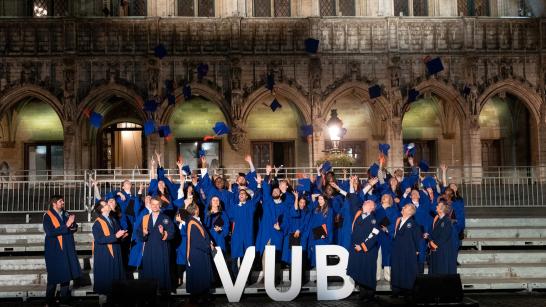
The Institute for European Studies (IES), a key partner in the BSoG alliance, has published its Annual Report for 2023 - a year marked by significant milestones. Highlighting the year was the conferral of the first Doctor Honoris Causa awarded by the IES, bestowed upon Korean Ambassador Yoon. Additionally, the institute successfully initiated its second European Research Council (ERC) project and secured a third ERC project, set to commence in 2024. The IES was also actively involved in over 60 externally funded projects and hosted the 8th edition of the EU in International Affairs (EUIA) conference. 2023 also saw new leadership dynamics with the election of a new (Vice) Dean and the welcoming of new members to the IES Board. Milestones, thus, on both the academic as well as on the operational side.
Academic milestones
In comparison with 2022, the IES took part in less externally funded research projects, yet these projects became bigger and generated more income. Notably a second ERC project started (worth more than 1 million EUR over 4 years) and a third one was acquired to start in 2024. Overall, 57 externally funded projects (for an aggregated income of more than 3 million EUR) and 27 self-subsidised projects were carried out in 2023. The IES was proud to count 9 Horizon Europe projects, 7 Jean Monnet projects, and more than 10 other EU-funded projects in its portfolio, making the IES one of the most successful European grantees at the VUB.
In addition, it continued to work on three special academic “Chairs”: the Korea Chair, the Japan Chair, and the Microsoft Chair on Digital Sovereignty.
Our scholars published 186 book chapters, policy briefs and journal articles and were visible to the public at large during a wide range of public debates in Brussels and abroad, not in the least during our successful biannual EUIA conference.
IES researchers were also called upon for a high number of recorded national and international media appearances. This is proof that our Institute continues to be of high relevance in the policy and research community and a much sought-after public source for scientific and policy oriented information.
Our educational portfolio also underwent a very thorough curriculum and organisational change. Starting from the next academic year, our LL.M. programme will shift to an evening programme, allowing for young professionals to join – a request that many voiced in the past years. It will also be better integrated into our overall programme portfolio, allowing for more synergies between research and teaching on the one hand, and between the different programmes on the other hand.
Another very positive result is the number of graduated PhD students. In 2023, no less than 5 PhD students successfully defended their thesis. We are proud to welcome Tudor Petru Fabian, Philipp Stutz, Maximilian Ernst, Asma Akbar and Jana Gheuens as new ‘doctors’ in the academic community.
Operational milestones
On the operational side, the IES underwent a number of changes. Four Board members retired from their position, and consequently four new Board members took office. Karel De Gucht, who started his third term as President of the IES, will continue to preside over the Board, while the academic head of the Institute, Luc Soete, announced his departure at the end of 2023. Meanwhile, Vice-Dean for Research Alexander Mattelaer refrained from running for a second term, and was replaced by Florian Trauner, who was elected alongside Sven Van Kerckhoven (who starts his second term as Vice-Dean for Education). 2023 marked the first time that these offices were elected in a census that involved all staff members.
We are glad to report that the relations with VUB and Vesalius College continued to flourish. Specific agreements with the university were concluded in the past year, resulting in better support and better integration – a development that was welcomed by both sides. The integration with Vesalius College into the Brussels School of Governance alliance is also improving and proves to be beneficial for both staff and students.
Relations with our other main partners continued: with UNU-CRIS, discussions led to a new call for projects to be carried out in Bruges; with the Diplomatic Academy in Vienna, we organised our 20th joint summer school, with Warwick University, Egmont and IEE-ULB we organised our 8th EUIA conference, with USC we organised our annual summer programme and with our Japanese and Korean partners we continued the flourishing Japan and Korea Chairs. As part of VUB, the IES also continued its involvement in the European university network EUTOPIA.
Financially, the IES is doing very well. The Institute will close the year with a surplus of more than 460K EUR, another welcome milestone (after a few years of losses) which it will re-invest in new projects. As the profit was primarily the result of profits in research, it will be distributed as reserves for the four research centres. With the reforms carried out in the education field, we are convinced that future results will be equally positive in that department as well.